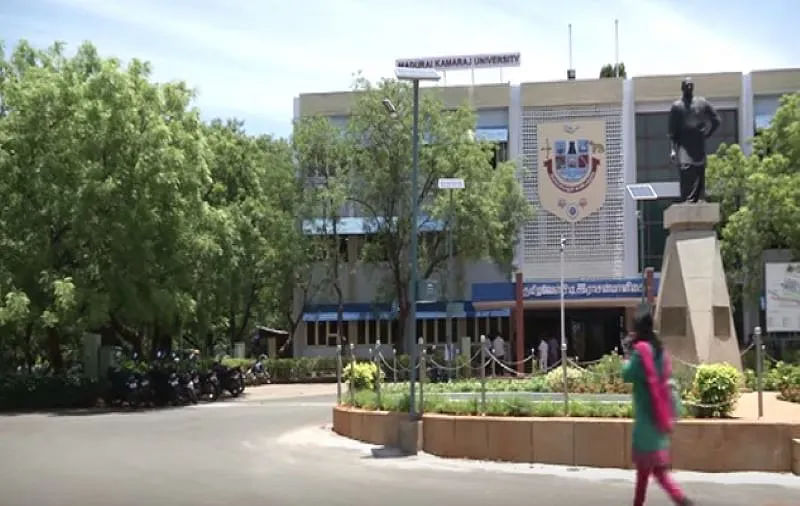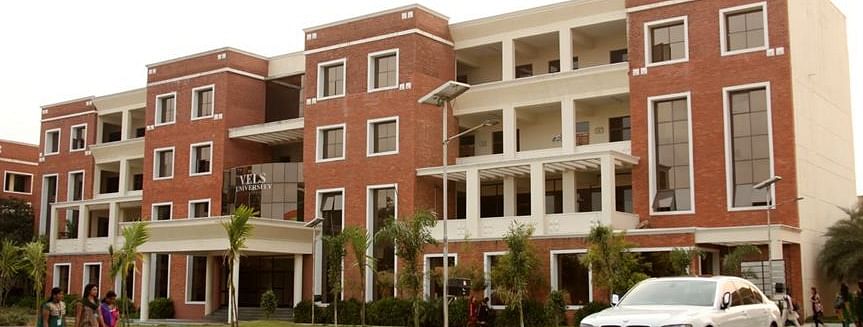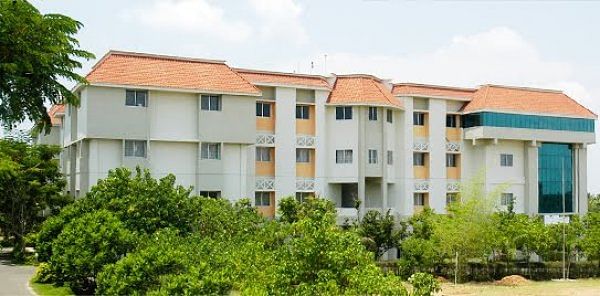MBA in Airport Management: Course Details, Eligibility, Admission, Fees

MBA in Airport Management is a two-year post-graduation course that deals with various aspects of managing and operating airports such as aviation regulations, airport planning and design, airline operations, financial management, customer service, and air traffic management. Engaging in real-world projects, hands-on internships, concise short-term assignments, and dynamic interactive case studies equips graduates for assured career development.
MBA Airport Management admission eligibility criteria require that candidates have a minimum of 50% in their bachelor's degree for the unreserved category, while relaxations of 5% are offered for SC/ST/PwD categories. The average fee for an MBA in Airport Management ranges from INR 30,000 - 3 LPA and the average salary of an MBA in Airport Management graduate starts from INR 3 - 7 LPA.
Table of Contents
- About MBA in Airport Management
- MBA in Airport Management Eligibility Criteria
- Why Choose MBA in Airport Management Course?
- MBA in Airport Management Admission Process
- Popular MBA in Airport Management Entrance Exams
- Top Colleges for MBA in Airport Management with Fee Details
- Types of MBA in Airport Management
- MBA in Airport Management Syllabus and Subjects
- MBA in Airport Management vs MBA in Aviation Management
- Courses After MBA in Airport Management
- MBA in Airport Management Salary in India
- Career Options After MBA in Airport Management
- Skills to Excel in MBA in Airport Management
MBA in Airport Management Course Details
| Degree | Masters |
| Full Form | Master of Business Administration in Airport Management |
| Duration | 2 Years |
| Age | No age restriction |
| Entrance Exam | CAT, MAT, CMAT, NMAT, TANCET |
| Minimum Percentage | Minimum of 50% average marks in under-graduation for the general category [40-45% for reserved category] |
| Average Fees | ₹1 - 25 LPA |
| Average Salary | INR 3 - 7 LPA |
| Employment Roles | Airport Managers, Airport Business Development Associate, Customer Relationship Manager |
About MBA in Airport Management
MBA in Airport Management curriculum focuses on domains relevant to efficient airport operations. These encompass aviation regulations, strategic airport planning, intricate airline operations, effective financial management, elevated customer service, and optimized air traffic management. This program falls under the umbrella of an MBA course and ensures that graduates possess expertise for roles in airport administration, management, and associated sectors.
For MBA in Airport Management admissions, candidates must achieve competitive scores in exams like CAT, XAT, and MAT. Upon completing the MBA in Airport Management, graduates pursue promising careers in the airline and aviation sectors.
MBA in Airport Management Eligibility Criteria
The eligibility requirements for an MBA in Airport Management may vary depending on the college requirements, but most institutions have certain requirements that all applicants must meet. These requirements are as follows:
- Applicants must hold a bachelor's degree in any comparable discipline with a minimum of 50% aggregate from a recognized university.
- Applicants from reserved categories, such as SC/ST/PWD, must have a minimum of 45% aggregate marks in their Bachelor's degree.
- Some institutions such as Fighter Wings Academy may also require a candidate to have some job experience.
- Clearing cut-offs for certain MBA entrance exams such as CAT, MAT, etc.
Why Choose MBA in Airport Management Course?
MBA in Airport Management enhances the opportunity for students to explore a booming industry within a rapidly growing and technologically driven sector. Listed below are some of the reasons why a student should consider pursuing an MBA in Airport Management.
- The Aviation Market is set to rise to USD 386.21 billion by 2028 (CAGR: 2.95%), showcasing ample career prospects.
- Secure positions in prestigious companies like Air India, Indigo Airlines, GoAir, and Jet Airways for remarkable placement potential.
- Despite COVID-19, the sector is bouncing back; international air passenger traffic surged by 229.5% in June 2022. Escalating demand for helicopters and jets reinforces industry robustness.
- Schemes like Krishi UDAN 2.0 and UDAN are shaping the industry's future, connecting unserved and under-served airports and improving air travel affordability. Over 2.15 lakh UDAN flights have been operated, benefiting more than 1.1 crore passengers.
MBA in Airport Management Admission Process
Admission to the MBA in Airport Management is available both online and offline mode. The usual step-by-step MBA admission method used by institutions is outlined below:
- Step 1: Eligible candidates need to fill up the application forms of the chosen university either online registration through the designated admission portal or offline registration by visiting the institution's admission office.
- Step 2: Students must meet the cut-off for college-accepted entrance tests.
- Step 3: Following the administration of the entrance exam and the release of the results, universities and colleges will publish their cut-offs to begin the admissions process.
- Step 4: After the merit list is published, candidates are invited to participate in the GD and interview process.
- Step 5: After being accepted, students must upload the required documents and pay the MBA course fees.
Popular MBA in Airport Management Entrance Exams
To secure admission into MBA in Aviation Management programs across India, students are required to participate in entrance exams conducted at the national, state, or college levels. Institutions offering MBA in Airport Management accept the exams specified in the table below.
|
Entrance Exam |
Accepting Colleges |
Registration Date |
|
CAT |
Periyar University, YBN University, Fighter Wings Aviation Academy |
Aug 2 - Sep 13, 2023 |
|
MAT |
Periyar University, YBN University, Fighter Wings Aviation Academy |
Aug 17 - Sep 14, 2023 |
|
CMAT |
YBN University, Fighter Wings Aviation Academy |
February 2024 |
|
NMAT |
YBN University, Fighter Wings Aviation Academy |
Aug 1 - Oct 10, 2023 |
|
TANCET |
Bharathiar University, Periyar University |
February 2024 (Tentative) |
Top Colleges for MBA in Airport Management with Fee Details
Candidates interested in pursuing an MBA in Airport Management can apply for some of the best programs offered by top MBA colleges across the country, that focus on the overall holistic development of selected candidates. Listed in the table below is an overview of the top universities and institutions offering MBA in Airport Management along with their fee breakup:
|
Institutions |
Average Annual Fee |
Total Program Fee |
|
Bharathiar University |
INR 13,000 |
INR 38,000 |
|
Periyar University |
INR 9,490 |
INR 20,000 |
|
YBN University |
INR 40,000 |
INR 90,000 |
|
Fighter Wings Aviation Academy |
INR 1,40,000 |
INR 3,00,000 |
|
Aarupadai Veedu Institute of Technology |
INR 1,00,000 |
INR 1,20,000 |
Types of MBA in Airport Management
MBA in Airport Management is offered in various formats, including full-time, part-time, online, and distance learning ensuring that both recent graduates and working professionals can pursue advanced education.
Listed in the table below are the different types of MBA in Airport Management courses, each tailored to meet specific needs:
|
Type |
Description |
Eligibility |
Colleges |
Duration |
|
Full-Time MBA in Airport Management |
For recent graduates or those willing to commit full-time to their studies. |
Bachelor's degree (55%), Entrance Exam (CAT, MAT, etc.). |
Bharathiar University, Periyar University, AVIT |
About 2 years |
|
Part-Time MBA in Airport Management |
For working professionals who wish to advance their careers while continuing to work. |
Bachelor's degree (55%), 2-3 years of work experience. |
YBN University, IIAEM, NCAA, FWAA |
Around 3 years. |
|
Online MBA in Airport Management |
For individuals who prefer a flexible learning environment and the convenience of studying remotely. |
Bachelor's degree (50-55%), some programs require work experience. |
IMTS, IGNOU, Jain University |
About 2-2.5 years |
|
Distance MBA in Airport Management |
For individuals who require a more flexible study structure. |
Bachelor's degree (45-50%), some programs require work experience. |
UPES, MJU-DDE, KSOU |
About 2-3 years, remote study with occasional on-campus sessions. |
MBA in Airport Management Syllabus and Subjects
An MBA in Airport Management is designed to provide a deep understanding of the aviation industry's unique challenges and opportunities, ensuring graduates are well-prepared to contribute effectively to the successful management of airports. MBA in Airport Management syllabus encompasses a range of subjects that cover various facets of airport management, enabling students to develop expertise in areas such as operations, safety, logistics, and strategic planning.
Here's an overview of the key subjects typically included in the syllabus:
|
Topics Covered |
Subjects |
|
Management Fundamentals |
Principles of Management, Organizational Behavior, Marketing Management, Financial Management, Human Resource Management, Operations Management |
|
Strategic Management |
Strategic Planning, Corporate Governance, and Ethics |
|
Accounting and Finance |
Financial Accounting, Managerial Accounting, Financial Analysis and Reporting, Budgeting and Financial Planning, International Finance |
|
Technology and Innovation |
Information Technology in Aviation, Airport Management Systems |
|
Airline Industry |
Aviation Economics, Airline Management, Aviation Marketing and Sales, Airline Finance and Revenue Management |
|
Passenger Experience and Services |
Passenger Handling and Services, Customer Relationship Management in Aviation |
|
Elective Subjects (Varies by Institution) |
Air Cargo Management, Airport Marketing and Branding, Airline Operations Management, Crisis Management in Aviation |
MBA in Airport Management vs MBA in Aviation Management
MBA in Airport Management and MBA in Aviation Management cater to distinct facets of the airline industry. While an MBA in Aviation Management encompasses the broader aviation industry, including airlines, airports, aviation manufacturing, and allied services, an MBA in Airport Management concentrates specifically on airport operations, management, and related services.
Listed below are some differences between the two courses
|
Parameters |
MBA in Airport Management |
MBA in Aviation Management |
|
Full-Form |
Master of Business Administration in Airport Management |
Master of Business Administration in Aviation Management |
|
Overview |
Dives deep into airport infrastructure, administration, customer service, security, and regulatory compliance. |
Offers a comprehensive view of aviation business, strategy, operations, and industry trends. |
|
Eligibility |
50% in graduation for unreserved category and 45% for reserved categories |
50% in graduation for unreserved category and 45% for reserved categories |
|
Duration |
2 Years |
2 Years |
|
Average Fee |
INR 30,000 - 3 LPA |
INR 1-8 LPA |
|
Job Roles |
Airport Managers, Airport Business Development Associate, Customer Relationship Manager |
Aviation Operations Specialist, Aviation Manager, Cabin Crew. |
|
Average Salary |
INR 3 - 7 LPA |
INR 6-10 LPA |
Courses After MBA in Airport Management
After completing an MBA in Airport Management, graduates can consider pursuing advanced qualifications such as academic or research careers and specialize even further within the airline industry. Courses after MBA in Airport Management include
MBA in Airport Management Salary in India
An MBA in Airport Management not only allows effective management and growth of airports but also offers diverse opportunities for career progression with competitive salaries ranging from INR 3- 7 LPA to its employees. Completing an MBA in Airline Management opens doors for several job opportunities. Listed below are some of the job roles along with their indicative starting average fee as a fresher and after 5 years of experience:
|
Jobs |
Description |
Average Salary (Fresher) |
Average Salary (After 5 Years of Experience) |
|
Airport Operations Executive |
Managing day-to-day operations such as runway maintenance, air traffic control, and coordination with airlines. |
INR 3.2 LPA |
INR 7 LPA |
|
Airport Business Development Associate |
Identifying opportunities for business growth, negotiating contracts with airlines, retail vendors, and other stakeholders. |
INR 3.1 LPA |
INR 7 LPA |
|
Airport Commercial Executive |
Overseeing retail and commercial areas within the airport, optimizing concessions, and managing leases. |
INR 3 LPA |
INR 6 LPA |
|
Airport Planning and Development Executive |
Leading infrastructure projects, terminal design, and expansion initiatives to accommodate growth. |
INR 3.2 LPA |
INR 7 LPA |
|
Airline-Airport Relations Specialist |
Building and maintaining positive relationships with airlines, negotiating contracts, and ensuring smooth operations. |
INR 3 LPA |
INR 7 LPA |
Career Options After MBA in Airport Management
Completion of an MBA in Airport Management opens doors to a broad job scope within the aviation sector. Graduates are poised to take on pivotal responsibilities in various capacities, contributing to the efficient functioning, growth, and development of airports and related operations. Here are potential job opportunities that await individuals with an MBA in Airport Management:
- Airport Manager
- Operations Manager
- Market Research Analyst
- Business Development Manager
- Aviation Marketing Manager
- Finance Manager
- Airport Commercial Executive
- Customer Relationship Manager
Top Recruiters for MBA in Airport Management
Prominent employers seek graduates with an MBA in Airline Management to fulfill the increasing demands of the airline industry. These industry leaders offer compelling career opportunities, listed in the table below are some of the top recruiters along with their average salaries:
|
Top Recruiters |
Average Salary |
|
Air India |
INR 5 LPA |
|
Qatar Airways |
INR 7 LPA |
|
Airports Authority of India |
INR 6 LPA |
|
Air Asia |
INR 4 LPA |
|
IndiGo |
INR 4 LPA |
Skills to Excel in MBA in Airport Management
MBA in Airport Management demands skilled individuals to grasp the technicalities and regulations of the airport industry. Listed below are some key skills to work on:
- Airport Operations: Understanding the day-to-day functioning of airports, including managing flights, gates, runways, and terminal operations, is crucial for efficient airport management.
- Safety Protocols: Implementing and enforcing stringent safety protocols, both for passengers and staff, is essential to prevent accidents and emergencies.
- Crisis Management: Being prepared to handle emergencies, disruptions, and unexpected events is essential for minimizing negative impacts on operations and maintaining public trust.
- Communication: Effective communication ensures smooth coordination among various departments, airlines, and stakeholders for successful operations.
- Technology Proficiency: Familiarity with aviation technology, such as airport management systems and passenger flow analytics, which helps optimize operations and improve the passenger experience.
- Customer Service: Providing excellent customer service enhances passenger satisfaction and contributes to the airport's reputation.
Top MBA in Airport Management Colleges
Top Management Entrance Exams
MBA in Airport Management Fee Structure
FAQs on MBA in Airport Management
Q: What is an MBA in Airport Management?
Q: What is the eligibility for MBA in Airport Management?
Q: What is the salary of an Airport Manager with an MBA in Airport Management?
Q: How many years is the duration of an MBA in Airport Management?
Q: Is there scope in MBA in Airport Management?





















